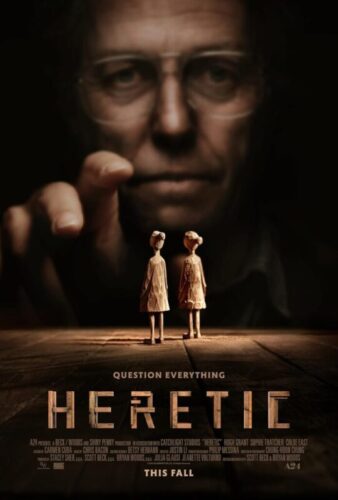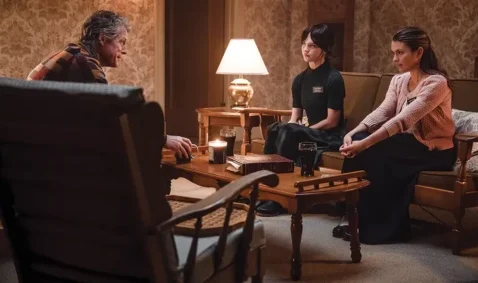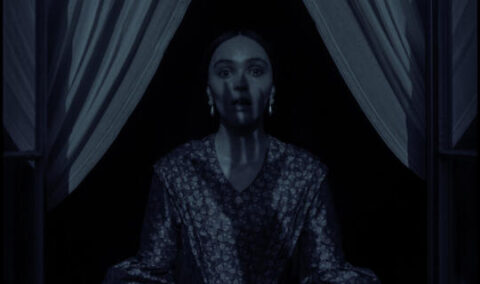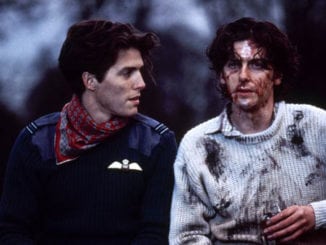Heretic (2024)
Directed by: Bryan Woods, Scott Beck
Written by: Bryan Woods, Scott Beck
Starring: Chloe East, Hugh Grant, Sophie Thatcher
USA
IN CINEMAS NOW
RUNNING TIME: 113 mins
REVIEWED BY: Dr Lenera

Two missionaries of the Church of Jesus Christ of Latter-day Saints [modern day Mormonism], Barnes and Paxton, arrive at the home of a reclusive Englishman, Mr. Reed, who’s interested in converting to their religion but needs a bit of a “push”. Reed is eloquent and a good debater, but makes the girls uncomfortable with some of his questioning and some of the things he wants to talk about, while Reed’s wife seems to be continually keeping out of the way. Eventually the girls try to leave but discover that they’re trapped inside Reed’s house. Reed has plans for them, plans that involve his need for them to discover the “one true religion”….

My views on religion have changed over my lifetime. It was all but drummed into me as a kid, then as a mid-teenager I totally rejected it and hated it, then a decade or so ago I came to what I suppose is a “centrist” position on the subject. Religion ain’t for me, and it has definitely caused so much division, so many wars and so many deaths, yet most of the world faiths contain lessons for us, and it’s certainly helped some people who I know personally. Heretic takes the subject and debates it and asks questions in a way few films intended for the commercial market are brave enough to do, yet manages do it in a rather satisfying slow-burner of a horror movie which, if you think about it, consists largely of three people chatting in dark rooms, but is most definitely not boring because of the high quality of the acting, the direction and of course the script. The supposed gulf between being a claustrophobic intimate talkathon and containing big, big ideas about humanity from the time it began manages to not be a thing here, and there’s still time for much edge of seat tension and a few gore scenes which exist right on the edge of the ’15’ rating. It’s really quite a surprise from Bryan Woods and Scott Woods, whose other writer / director collaborations, both guys sharing both duties, are the extremely disappointing sci-fi thriller 65 and the undeniably fun but unremarkable slasher Haunt, neither of which prepared this critic for the sheer quality of what was instore for this critic when he sat down in the auditorium. Then again times have certainly changed, seeing as these days he actually looks forward to the next Hugh Grant movie and performance.
The opening dialogue scene between our two girls is a nice if somewhat odd opener, the camera slowly pulling back from them sitting on a bench to reveal a huge advertisement for condoms on the back of the bench while Paxton describes to a somewhat bewildered Reed about a pornographic movie she watched where one of the participants revealed herself to be a strong Christian, her enjoyment of being filmed having sex with a stranger not mattering because it’s all about her personal relationship with God. This itself raises interesting questions, even though it’s something which the film itself doesn’t return to except obliquely, and not because I once knew a lady who was a very “full-on” “believer” and went to church often, yet had a very – how should I describe it without sounding judgemental? – “free and easy” sex life. The two things didn’t initially compute, but a bit of thought eventually revealed to me that there’s no real reason why they shouldn’t. This little scene does let us know that this is a film that will engage the brain, and even a film which some viewers will be divided over in terms of what it’s saying, or what they think it’s saying. The two have to visit Mr. Reed who’s on the verge of conversion but needs help getting there. They enter after Reed tells them that his wife is preparing a blueberry pie, and they begin to discuss religion, which is initially fine, but then Reed makes several uncomfortable comments about the Mormon faith and the nature of belief, in particular about the Mormons initially being a sect which believed in men having multiple wives, to which Paxton responds that it was necessary back then because lots of people were dying and the Mormons needed to multiply. The Mormons eventually did away with this idea, though Reed doesn’t seem to think that it’s that bad a thing.
Reed briefly steps out of the room, and Barnes notices that the smell of blueberry pie is actually from a candle. Then the pair realise that the front door is locked and they have no phone signal; seeing as I grew up before mobile phones became a thing, I still chuckle at how there being no signal is the true sign that Things Are Bad. Reed then proceeds to give a lecture, with visual aid, on how all religions are copies and how there’s only one true religion. So, regarding his first point, does what he’s saying hold water? He begins by saying that Judaism spawned Christianity, then Islam and finally the comparatively feeble Mormonism, which is a view that certainly does hold some water. He then tells us how so many religions contain a story which is remarkably similar to that of Jesus, meaning that they were just copying each other. I reckon that this is more down to the fact that, ignoring things like the many version of the Great Flood which probably did actually happen, essentially, there aren’t that many basic, archetypal, stories. Think of, for example, the myriad of “hero” tales that began with the Sumerian Gilgamesh and which contain so many parallels with each other. And influence is able to exist without it becoming plagiarism. Nonetheless, it’s a fascinating concept. After telling of all this, Reed offers the girls their coats and promises that he won’t keep them if they wish to leave, but sadly states that the front door is bolted so they will have to leave another way. They really want to leave, but the doors they try aren’t exactly passages to safety. Reed only gives the girls a choice of two other doors to go through in order to exit the house; one if they still believe in God, and one if they don’t. Barnes rebels and tells him that several of his claims are nonsense, before they both enter the “Belief” door.

Where will it lead? Will they escape? Who’s the strange disfigured woman who lurks in one of the [seemingly] many cellars? Can people die and then he resurrected? Is everything we see real? And – perhaps most important of all – what is the One True Religion? Don’t expect proper answers to all of these things. While Heretic never becomes anywhere near poor, there might be a case for the first half being superior to the second. The scenes that comprise the first half, despite little on the surface really happening for ages, work so incredibly well, you just can’t think of them being done better, the tension calmly, methodically building. The cinematography by Chung-hoon Chung’s is an important factor here, often employing closeups but usually with Grant a bit closer to the screen than Barnes and Parton so he’s more imposing, circular camera moves becoming longer while the focus is more on characters listening rather than speaking, which of course asks more of the performers, yet they rise to the occasion. Right from when we meet him, Grant gives a terrific performance of a person that you’re really kept in suspense about as to what he’s going to say or do next, the actor clearly relishing the chance to engage in what are basically soliloquies [and do a Jar Jar impression] while keeping his carefully modulated portrayal of a psychopath convincing even when you chuckle at him. Sophie Thatcher and Chloe East at times threaten to match him even early on, their reactions to what they see and hear always being believable considering the kind of people that they are.
It’s easy at first to side with Reed against the girls, who are probably the types who go around knocking on people’s houses, especially if you really detest this religion lark, and even as he gets increasingly menacing, many are likely to properly think about some of the stuff that he’s saying and will still agree with him on certain points. As plot surprises [for a considerable amount of time I really expected the death of a loved one to be the main cause of Reed’s actions] and the blood begins to run, not to mention a reference to one of my favourite bits in The Shining even though it’s a bit which doesn’t really make sense, Reed starts to contradict himself, but that isn’t necessarily a flaw of the writing; he’s mad, after all, and his stumbling at losing the odd discussion or being actually being proved wrong contain probably Grant’s best moments in this film. The switch from fairly dark settings to very dark settings isn’t a problem visually as Chung seems able to make the darkest set seem photogenic while maintaining the impression that the house itself is alive in some way, or at least an extension of Reed’s mind. There’s also a wonderful bit where somebody wants to get hold of something that’s at the end of a rug and the camera gets up close and tracks alongside it until it reaches the object, making it seem far further away than it actually is. There’s great grasp of cinema technique throughout, and always in the service of the situations. On the other hand, more could have maybe been done with a short detour into Matrix-type stuff, a couple of happenings towards the end are a bit hard to believe, and one or two things aren’t properly explained. I do also feel that the film could have ended a minute before it actually does. But then I do like my downbeat finales, probably more than most.
As for the One True Religion, Reed does eventually tell us what he thinks it is. Do we agree? Some will, some won’t. The answer that’s given to us gives the impression that, at the end of the day, Woods and Beck are more anti-religion than for it, though they’re still able to give us some thought provoking reflection on things such as free will, control and happiness in a more profound way than one would expect, though then again the horror genre has always been a place where filmmakers can look at a lot of themes more easily and acceptably than in other ones. And one can’t help but love the idea that true freedom and peace come from helping others, even if many of us don’t carry that out anywhere near as much as we should. Despite all this, Heretic is still a horror movie, and one of the best of the year.
Rating: 














Be the first to comment